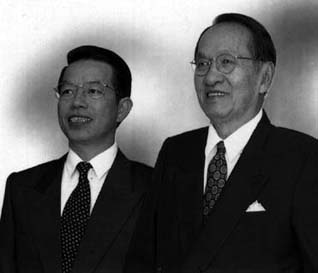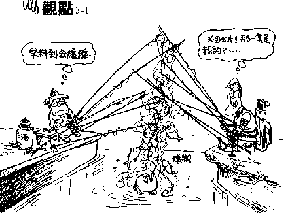 Taiwan
Communiqué No. 70, March 1996
Taiwan
Communiqué No. 70, March 1996 Taiwan
Communiqué No. 70, March 1996
Taiwan
Communiqué No. 70, March 1996Taiwan's 23 March 1996 presidential elections are not only overshadowed by China's military threats (see following story), but also give the Taiwanese voters a complex choice of candidates and issues. It is the first time that the people on the island will be able to cast a direct vote for their President. Until 1992, the President was selected by the ruling Kuomintang in a closely-controlled vote in the National Assembly a body mainly consisting of old Chinese mainlanders, who came over with Chiang Kai-shek in the 1940s. It is thus the culmination of Taiwan's transition from fifty years of one-party KMT dictatorship to a full-fledged democracy. Below we give a brief overview of the candidates, the issues, and an assessment of the fairness of the campaign.
The DPP's candidate is Professor Peng Ming-min, a former political science professor at Taiwan National University, who won the DPP's primary in September 1995. Professor Peng is a long-time political activist, who played a pioneering role in the island's democracy movement: in 1964 he was arrested and imprisoned for publishing a manifesto titled "A Declaration of Formosan Self-Salvation", a document in which he and his co-workers called on the Kuomintang authorities to abandon their goal of "recovering" China, and urged the establishment of a democratic system under constitutional rule on the island.
His running mate is Mr. Hsieh Chang-t'ing, a prominent lawyer,
who became well-know in Taiwan in 1980, when he served on the defense team
for the "Kaohsiung Eight." This trial of eight major opposition
leaders, who were arrested after the December 1979 Kaohsiung Incident, a
human rights day celebration which became a turning point in Taiwan's
history. For further background information, see Taiwan Communiqué
issues no. 68 and 69.

Professor Peng and Mr. Hsieh's campaign has focused on rediscovery of the Taiwanese identity, in contrast to the Kuomintang's emphasis on its Chinese heritage. As an example: under the Kuomintang-dominated education system, history classes teach children in Taiwan only about ancient Chinese emperors, but never anything about Taiwan's own history. The DPP intends to change that.
Professor Peng also rejected Beijing's "One country, two systems" formula, reminding his audiences that the Chinese Communists had made exactly the same promises to Tibet in 1951.
Asked if his party's pro-independence platform is "provocative" to China, Professor Peng points out that if China is motivated by ethnic nationalism or aspirations for territorial expansion, then neither the DPP nor the KMT positions (of indefinitely postponed unification) can provide any guarantee against Chinese aggression. He stated that from any perspective political, economic, legal, historic, or cultural it is clear that Taiwan is not part of China.
President Lee Teng-hui does at the moment hold a lead, but a number of dissenting Kuomintang members have declared their own candidacy, and are expected to cut into the KMT's dwindling support on the island. During the past few years the Kuomintang's percentage in elections has dropped from near 80 percent in the late 1980s to less than 50 percent during the most recent Legislative Yuan elections of December 1995.
Still, Mr. Lee is a popular politician, who has increasingly presented himself as the populist "Taiwanese President." He has campaigned hard, in particular in the Southern part of the island, where he often spoke in Taiwanese instead of the Mandarin dialect brought over by the Nationalists from China. He has also been able to make use of his incumbency by spreading improvements of roads and sewer systems to areas where he campaigned.
Another major "plus" for Mr. Lee in his campaign is the fact that he is being attacked so ferociously by the Communist authorities in Beijing. These attacks are having the opposite effect, since they strengthen the "Taiwan-solidarity" feeling among the population, and strengthen his support, in particular since he has increasingly presented himself as being "Taiwanese."
Officially Mr. Lee still adheres to the old and outdated Kuomintang policy of "unification" with China, but has stated that this can in due time only happen if China becomes democratic and has a level of economic development comparable to that of Taiwan.
The third candidate is Mr. Lin Yang-kang, a former vice-chairman
of the Kuomintang, who declared his candidacy in August 1995. Mr. Lin has
always been closely associated with the right-wing "Non-Mainstream"
faction of the KMT. He is thus a rival of
President Lee, who
heads the "Mainstream" faction, which has gradually liberalized
the party and the political system on the island. Mr. Lin is generally
considered to be opportunistic, always eager to boost his own political
ambitions at the expense of principles.
Mr. Lin's link-up with old hardliner-general and former Prime Minister
Hau Pei-tsun as vice-presidential candidate seemed to have been a
marriage-of-convenience. The pair is mainly receiving support from the
extremist pro-"unification" groupings of the

"Non-Mainstream" faction in the Kuomintang and the New
Party. The pair has been relentlessly attacking President Lee Teng-hui for
"betraying" the principles of the Kuomintang and for moving
Taiwan into the direction of independence.
To add to the confusion in the pro-unification camp, Mr. Chen Li-an, the son of a former KMT prime minister, also declared his candidacy. According to estimates by observers, he will not get more than 10 percent of the vote.
In spite of the fact that these are the first presidential elections in Taiwan's history, and that open and free-for-all campaigning was allowed, the process was still flawed. The elections can thus still not be considered fair, since there is not a level playing field for the candidates. The principal shortcomings are:
The National Assembly not to be confused with the Legislative Yuan (which is the real legislature) is gradually becoming more irrelevant, since its main function used to be the election of the President. The democratic opposition of the DPP has argued for abolishing the National Assembly, and will not devote significant resources to that part of the election.
Back to: Table of Contents
Copyright © 1996 Taiwan Communiqué